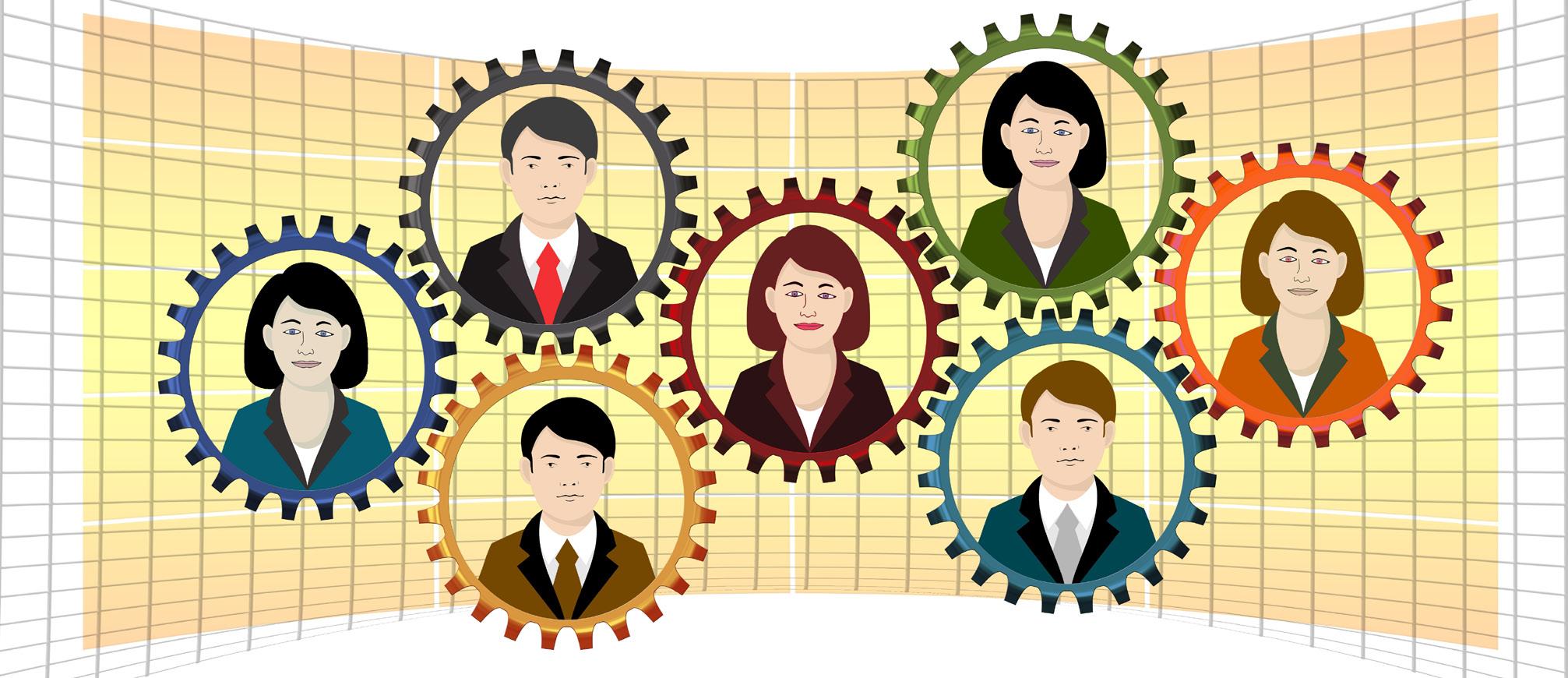
16 minute read
Women in Energy Management and Gender Barriers
The energy industry has one of the worst gender gaps in the working sector. Because of this, women are still finding themselves in situations that their male counterparts wouldn’t (most likely) have to go through. As women continue navigating gender barriers, they must assert themselves with power and confidence, and remember that we are all equal. Four women in energy and sustainability fields have agreed to share their experiences and reflect on how they dealt with and overcame these situations.
Rachel Feeney Energy Manager, Erda Energy
Advertisement

Have you had to address and overcome a situation that probably wouldn’t have happened to a male colleague?
At the end of last year, I found myself in a project handover meeting with all men, something I had grown used to after nearly 5 years in the thermal energy industry. There was a group of colleagues from my company and a group from the client’s company. As members of the meeting entered the room, we greeted each other with handshakes. One member of the client’s team entered the room and looked at my colleague and I, he proceeded to say: “I don’t think I have met you two before”, the man shook hands with my colleague and they introduced themselves. The man then turned to me, gave me a minor acknowledgement with a head nod, and proceeded to take his seat. At first, I was confused and realised my hand was still out waiting to shake his and formally introduce myself. I proceeded to look at him with a confused and now upset look on my face. He then said, “I do not shake hands with women out of respect for my wife”.
I am respectful of religious beliefs and customs, but this was confusing to me. I was not looked at by him as a colleague but as a female and he did not treat me the same way he treated my male counterpart. I wondered what he would have done if the majority of people in the meeting had been women.
What advice would you give to other women who are experiencing similar instances?
The situation above was witnessed by colleagues and my line manager.
Although they hadn’t said anything in the moment, each one of them spoke to me about it and apologised for not speaking up. To feel the support of colleagues felt good but I also wished I had been more prepared for the situation. In the future, I will be more prepared as I acknowledge his rule but introduce myself with name and title and a response that asserts my presence.
My self-confidence comes from knowing what to expect and being prepared. Often being in rooms like this that are male dominated can be quite overwhelming but if I am prepared from a content perspective, then socially I can assert my presence in other ways that go beyond a handshake and understanding how someone treats me is their foolishness not mine.
I feel statistically, women will continue to be at a disadvantage in our industry but if we put in the hours and know the ins and outs of our work, we will gain the respect of all colleagues no matter what gender they are. I also find that by sharing these experiences and how it made me feel helps to feel better and make colleagues aware that these types of things are still happening, and gender barriers still exist. This can serve as a reminder for colleagues to be looking out for things like this and have them prepared as well if something similar should happen in their presence.
Author’s profile: dismissive or disparaging comment that, whilst not intentiona lly being so can undermine the significance of an issue being discussed or a with others are key to creating a positive culture. Together, these are leading to positive changes for women in the industry.
Rachel has been working for Erda Energy, a geo-exchange solutions company, since 2018 and has recently been promoted to Energy Manager. Rachel has a passion for the environment and helping clients get closer to Net Zero goals. She lives in London and loves trail running in the Surrey Hills.

Rebecca Smart Energy Projects Support Officer
Have you had to address and overcome a situation that probably wouldn’t have happened to a male colleague?
Having worked in Energy Management for just over 6 years, I am pleased to say that I haven’t had any experiences in which my gender has impacted my career aims or my work goals. I have always worked in supportive environments. However, as may be common in many other industries, I have experienced an occasional point I am raising. The unintended consequence is that you could find yourself working harder than a male colleague might otherwise have to in order to convey the same message. Of course, this isn’t specific to gender only – my comparatively young age and the fact that I am relatively early in my career may have also played a part –but in common with other women, you can’t help but consider the role of gender in the interaction.
Encouragingly, such circumstances are rare. I believe one of the reasons for this is an increase in awareness of issues such as unconscious bias. Additionally, an increased number of women in the industry gives us role models which, in turn, helps us to be more confident in our expertise and in conveying that expertise. At the same time the environment in which we are working is becoming more aware of the importance of how interactions
What advice would you give to other women who are experiencing similar instances?
Working in Energy Management offers us all, both women and men, the advantage of working with facts and figures – this affords us the opportunity to back up our ideas and points with this information. One of the reasons I enjoy working in Energy Management is the clarity that data can provide. I have found that it is a useful tool to lean on when needing to highlight a point and put across my message. This can be particularly beneficial in the face of dismissive comments or if you feel you are not being listened to; the data can offer proof.
I previously mentioned an increase in awareness of unconscious bias and I have found that speaking with colleagues openly to discuss this has given interesting opportunities to hear different perspectives and experiences, and also to foster a more open and positive work culture. Work places can often mean interreacting with people outside of your usual peer group, and by speaking with different people you can widen your own (and others’) horizons and understanding.


In the case of potentially harmful comments it is difficult to give advice on these types of instances generally as I think they can be so dependent on the particular circumstances – such as how well do you know the relevant individual making the comment; is it a formal or informal context?; are other people present? However, if a situation arises that you would like to address, I would advise approaching the person privately, calmly and openly. Not only will this help your confidence, but it will also help the person understand why their comment may have been inappropriate.
Author’s profile:
Rebecca leads on the ISO 50001 and ISO 14001 certifications at her organisation where she manages and reports on energy consumption, energy and environmental compliance and has a role in energy procurement and finance.
Proof is in being able to understand the requirements and deliver for your business and client, if you can do this then the need for qualifications recedes compared to experience.
Sustainability Consultant Retrofit Sector
Have you had to address and overcome a situation that probably wouldn’t have happened to a male colleague?

I’ve worked in the construction sector for around 22 years. Some of this was in commercial fit-out and in the last 12 years in the sustainability/retrofit sector. I didn’t start my career with a constructionbased qualification but without giving a personal history, Architecture should have probably been my chosen career path and this was evident from age 15/16. Stepping into the sector without an obvious line of knowledge was daunting and I faced a number of challenges from men and women.
I moved into Sustainability because my interest is circular, design, buildings, environment, and this I think is a constant in my career history. I studied Geography as an undergraduate, and this touched on certain elements, as it is essentially a systems approach of looking at the problems facing our wider environment. As geographers, we are well placed to consider ‘systems’ and find ways of improving them. Of course, there is more to it than that, but let’s just place that within the context of this article.
In one position I held in my early design career, I was ‘caught’ reading the classifieds at the end of the working day. My director asked me to join him in his office and asked why I was looking for another job. I explained that I couldn’t afford to make ends meet on the salary I was employed on (1998 - £10k) and that I needed to supplement my income with an evening job. He wasn’t happy about me working two jobs in case I was needed to pull a drawing package together at the last minute and work late. His comment to me was: “Oh, I thought that you were doing this for pocket money and that your partner paid for everything else”. In reality, I shared the cost equally with my partner – he earned more than me so that was not an equitable division of costs.
In this same role, I was often the only female at project/site meetings. As a junior at the time, these were often quite daunting, but I was learning a lot about construction and project delivery at the same time. However, there were areas where I was a) leading (design) and b) dealing with other common-sense items that anyone could potentially answer. Many a time, I would either say something in response to a question or someone else’s comment only to be ignored by the whole table, and the man next to me picking it up shortly after as his own idea and be lauded (often – not always) for the comment or idea. Or the alternative was that I was ignored when raising issues several times, and then when I raised my voice to be heard, I was looked at with a derogatory expression! Of course, this is my interpretation of the situation. The scenarios played on many occasions.
Forward wind to the sustainability experience, I completed a masters in 2011, before my first employed position in the ‘retrofit’ industry. This time I came with the knowledge, though little direct experience of the industry, but still with 10 years of working in construction, designing and managing projects. My experience was often discounted, I think the term ‘interior designer’ in the sustainability sector was akin to working on Changing Rooms many great administrators, some with specific knowledge of a sector and others with knowledge of how to make projects work in the public sector – both important skills. However, with some contractors I believe seeing a woman, or perhaps female led team might seem like they are of the latter type rather than the former. I have so many experiences of mansplaining within this context that it’s hard to pick a specific one out. What I can say for sure is that in most instances I was far more educated on retrofit, building physics and taking a holistic viewpoint than the contractors I was working with.
(a programme that ran through the 90s and has recently been resurrected). Never a question of what this might have entailed, or where the cross over in experience might have been – so perhaps also a failing of my sustainability colleagues to ask the questions? Somehow my experience was seen as frivolous, again my interpretation of the situations. Would this have been the same for a male designer?
Working in a local authority context you are generally there to administer programmes. There are
In one particular instance, we were asked by our delivery contractor whether they could install internal wall insulation on the programme. Given the inherent risks associated with getting this right, and the many potential unintended consequences of not, I raised my concern. At the time my manager, also in the meeting, was male and he said to the contractor that they could, if they were able to, do Wufi modelling to prove that we wouldn’t have unintended consequences. The contractor hadn’t heard of Wufi. This theme continued, my line manager moved on and I had a female line manager. I was continually ignored by the contractor as they sought approval from my line manager who, not being technical, wasn’t able to give them a coherent answer. Internal wall insulation was not installed which was lucky as the contractor went into administration within 12 months. Thankfully, we did not have customers with half their plaster missing in the front room. At the same organisation, whilst working as an Installations Manager, I was told by the Project Director at one of the contractors that they were unable to get flue extensions for 5 boilers and therefore they would need to leave a 300mm uninsulated section around the flue – thus creating a massive thermal bridge. I said that it wasn’t acceptable and was told that he’d been doing this for 17 years and I was effectively the first to challenge what he was saying (no idea if that was true) but basically, he knew what he was talking about, and I should definitely just follow his lead. I asked him if he could give me the make and model number of the five boilers as I would like to check with the manufacturer why we couldn’t get extensions for these models. The contractor responded angrily, shouting: “Are you calling me a liar?!” To which I responded, no, I just want to make sure that we had all stones unturned (inside I was shouting – ‘no, I’m calling you out!’ but of course decorum meant that I didn’t make this statement). A week later, at the next progress meeting there was only one flue extension that couldn’t be sourced.

Funny that!
The regularity of this type of response got to the stage where I could attend a contract start meeting and probably know within the first 5 minutes of how the contractor reacted towards me as to how they would treat my knowledge and understanding, and capability to do the job as we moved into the contract. And equally as predictably, I could determine that at some point in to anyone else. My colleague, my line manager at the time, was a man and the same age, clearly, he wasn’t past it. These are just some examples. the contract I would be putting the contractor straight on something he had misunderstood through lack of knowledge on the subject matter, and invariably this would be in front of his colleagues, and this would be an embarrassing put down. It’s not big and it’s not clever, but forgive me my trivial triumphs when you’ve a lifetime of put downs and dismissal by men in the industry you work in.
I would also highlight that I have also been treated differently to how men would be treated by women in positions of power or as a client or project partner. It is not a oneway street and women need to be aware of their own gender bias (along with all the other protected characteristics) and try not to fall on old tropes –myself included!

At the same organisation, the Director of Energy told me I was ‘past it’ at a Christmas social. I was 41. OK, perhaps he had had too much to drink, yet I didn’t overhear him saying anything of this nature
I have recently had a similar incidence on LinkedIn where the response to a question I raised by one particular male was somewhat condescending – essentially, ‘well it’s clear that you don’t know what you’re talking about because if you did you wouldn’t have asked that particular question’. I opened a dialogue with this person and in one response suggested he take a look at my LinkedIn profile to see my experience before we took the conversation further. I know this happens to most people regardless the gender of the originator or the commenter; on applications such as LinkedIn. I have no idea why people can’t take 2 minutes to look at someone’s profile before jumping to conclusions!
None of the above include the inappropriate sexually oriented comments, and there have been many of these, though perhaps not as many as some women have received. I count myself lucky in that respect.
What advice would you give to other women who are experiencing similar instances?
At times, I have probably not dealt with the situations particularly well, with a choice of ‘acceptance’ – not worth getting upset about as it’s such a regular occurrence; ‘passiveaggressive responses’ – not the best way to get people on board and I wouldn’t recommend it, as it also doesn’t really make you feel good about yourself in the long run. I have been assertive, but this is often seen as aggression in women, and whilst it’s hard to judge how you come across to others, there have been instances where my assertion has definitely been misconstrued as aggression.
In an ideal world women should continue to behave as women, a general societal erosion of that narrow definition of acceptable behaviours (at the same time as breaking down the same limiting barriers for men) would mean that all ‘appropriate’ responses would be an acceptable way to deal with these types of infringements. We work towards it and hope that one day it will be.
There are instances now where I highlight the gender presumption in people, it’s polite but to the point. In my role as an assessor on a course where the majority of participants are male, I’m often presented with submissions that include the term ‘he’ in response to the roles being discussed. I politely point out in my feedback that the ‘he’ could also be ‘she’ and perhaps even ‘they’. I hope that by highlighting these minor but everyday assumptions, change will happen.
So, one of my suggestions to men is to consider the use of these simple terms in their everyday use. How might they like to read a 40 page+ contract where every reference to a person is SHE, and this represents the male and neuter. Because this is what women deal with every day. Another is to not presume what anyone’s qualification for their role is or assume that if they have that role, they are as qualified as they should be in order to carry it out. Given that we have social media sites like LinkedIn, I see no reason why you can’t take 2 minutes to find out about your new boss, work contact or others. And if you are erring to not believing a woman could be able to do the role you see her in, check in with yourself as to why you believe that.
There are many sectors still dominated by men but remember too, there are others that are dominated by women. We need to be as welcoming of men into those teams as we wish to be in our roles. We do not need to employ the same practices as men but we can point them out.

As a slight aside, there are times when there have been team socials, or event invites from contractors. These are invariably focused on male based interests – football, rugby, golf etc. I’d consider the rugby and a few other sports but where are the opportunities to do something less ‘male’ focused. I appreciate many women like these sports too, but we’re not being offered a trip to see the Lionesses play; or what about watching our Commonwealth gold medal winning Netball players, or many other different forms this could take?
Work socials? Mostly drinks after work – this precludes anyone (male and female) who needs to be home for childcare – even more difficult if you are a single parent (predominately females who have the main caregiving function, though not exclusively). What other options do we have?
Lunchtime socials? Where are the knit and natter sessions (not this exclusively but it has a nice ring to it and generally it’s a female pursuit)?
We have a long way to go before we move out of the work environment that has catered for men and doesn’t really consider the needs of women.
Victoria Limbrick Energy and Carbon Manager, RNLI
Have you had to address and overcome a situation that probably wouldn’t have happened to a male colleague?

Having an awareness of being the only woman in the room is the main situation that I have had to overcome throughout my career, the often self-imposed feeling of having to constantly prove myself to be as capable as my male colleagues or the other men in the room. I think this is as much to do with being the only ‘nonengineer’ in the room which comes with the job. This is commonly described as Imposter Syndrome and is something shared across all genders but is particularly something women find themselves dealing with.
I have talked to male colleagues about gender bias during my career and what their experiences are and they are surprised that the women around them feel these pressures as they know and respect their female colleagues as fellow professionals.
That being said, I have occasionally been the default person asked to make coffee or asked to take notes but even these occasions are very few and far between and are absolutely the exception. This can feel undermining in the moment but it can be fairly satisfying to present someone with a poor attitude with their coffee and then go on to provide the technical solution for implementing a complex energy efficiency project or lead on design improvement discussions.
I have been privileged to work with teams in which collaboration and professional ability are valued above and beyond any personal attribute.
What advice would you give to other women who are experiencing similar instances?
It is important that both men and women stand up to any poor behaviours if they see them during their work, or wider life. Women I have worked alongside have often described troubling limitations and upsetting situations they have experienced purely due to their gender and I feel we all have a responsibility to challenge this behaviour whenever we encounter it as well as offering support to those who experience it.
Having confidence in your own ability, experience and knowledge is difficult for many people no matter how good they are in the role they undertake. Measure yourself by your successes not by how well you have proven yourself against the man or woman next to you.
Author’s profile:
Victoria joined the RNLI in 2015, with responsibility for energy and carbon management throughout all of the RNLI’s operations, managing renewable technology installations, identifying opportunities for improvement and building a programme of behaviour change and engagement. Before joining the RNLI Victoria managed a Sustainability Team for a building services consultancy working on large mixed use, prime residential and education schemes.


